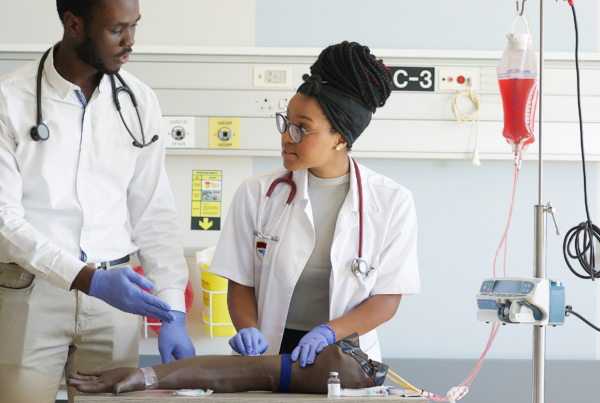Phlebotomy, the art of drawing blood for medical tests, transfusions, or research, is an essential part of healthcare. If you’re considering a career in this field, you’re likely asking yourself, “Is phlebotomy a good career?” It depends on your goals and interests in healthcare.
In this guide, we will explore the advantages and disadvantages of becoming a phlebotomist, the job outlook, salary expectations, and whether this career path aligns with your personal and professional aspirations.
| Key Takeaways |
| Phlebotomy offers a fast entry into healthcare: With minimal education requirements, you can start a rewarding career helping patients. |
| Job security is strong: The demand for phlebotomists is expected to grow significantly, providing stability in the healthcare industry. |
| The profession has its challenges: While phlebotomy offers a fulfilling career, it also comes with physical and emotional demands, limited advancement without further education, and moderate pay compared to other healthcare roles. |
| Certification boosts opportunities: While not always required, obtaining a certification can lead to better job prospects and a higher salary. |
What Makes Phlebotomy a Good Career? – The Pros
1. Quick Entry into the Healthcare Industry
One of the biggest advantages of pursuing a career in phlebotomy is the short path to employment. Compared to other healthcare professions, which often require years of education and costly degrees, phlebotomy offers a faster alternative. Many phlebotomy programs take just a few months to complete, allowing you to jump into the workforce sooner.
2. Minimal Educational Requirements
In most states, becoming a phlebotomist requires only a high school diploma or GED, followed by a certification course. While certification is not mandatory everywhere, it increases your employability and salary prospects. Unlike professions that require years of university education, phlebotomy offers a quick, affordable route into the medical field.
For instance, Phlebotomy Now School offers a 1-day hybrid certification program, which helps students become job-ready in a fraction of the time it takes to complete traditional healthcare courses.
3. High Job Demand and Security
The demand for phlebotomists is on the rise. According to the U.S. Bureau of Labor Statistics (BLS), employment for phlebotomists is expected to grow by 10% from 2022 to 2032, much faster than the average for other occupations. As medical facilities increasingly require phlebotomists to handle diagnostic blood work, job security in this field is quite strong.
This high demand ensures that phlebotomists can find employment across various healthcare settings such as hospitals, diagnostic labs, blood donation centers, and outpatient care centers.
4. Competitive Salary with Room for Growth
Phlebotomists earn a competitive wage considering the minimal education required. The average phlebotomist salary in the U.S. is approximately $37,000 per year, with experienced professionals earning even more, depending on their location and certifications.
In addition to a stable salary, many phlebotomy jobs come with excellent benefits such as health insurance, retirement plans, and paid time off, adding to the overall appeal of this career.
5. Hands-on Patient Care Experience
For those who enjoy working directly with patients, phlebotomy is a rewarding career. You will play a critical role in helping patients through blood draws that aid in diagnostics and treatment. Phlebotomists often interact with patients during stressful times, offering comfort and care, which can be deeply fulfilling if you’re passionate about making a positive impact in others’ lives.
6. Flexible Work Environments
Phlebotomists are needed in a variety of settings, from hospitals and clinics to labs and blood donation centers. This provides flexibility in terms of work environment and schedule, allowing you to choose a job that fits your lifestyle, whether you prefer a fast-paced hospital environment or a quieter lab setting.
Challenges of a Phlebotomy Career – The Cons
While phlebotomy has many perks, it’s important to weigh the challenges as well to determine whether it’s the right fit for you.
1. Physically and Emotionally Demanding Work
Phlebotomy can be physically exhausting. Phlebotomists spend long hours on their feet, moving between patient rooms, labs, or clinics. In addition, they must be able to handle patients of all ages and conditions, including those who may be anxious, unwell, or difficult to work with.
Emotionally, the job can also be demanding. Working in a hospital or clinic exposes you to a variety of patient conditions, some of which may be distressing. You must remain calm, empathetic, and professional, even in challenging situations.
2. Lower Salary Compared to Other Healthcare Professions
While phlebotomists earn a reasonable income for the level of education required, the salary is lower compared to other healthcare jobs like nursing or radiology. If you’re seeking a higher-paying healthcare position, you may need to pursue further education and training to advance in your career.
3. Limited Advancement Opportunities
One of the drawbacks of a phlebotomy career is that advancement opportunities can be somewhat limited unless you continue your education. If you’re looking to move into higher-paying roles or more specialized fields within healthcare, you may need to pursue further training in nursing, laboratory technology, or other medical fields.
4. Stressful Work Environment
Healthcare settings are often fast-paced, and phlebotomists must be able to manage multiple tasks efficiently. Juggling patient care, maintaining cleanliness, labeling samples, and ensuring accurate data can lead to stressful workdays. Some phlebotomists may also work in high-pressure environments like emergency rooms, where the pace is even faster.
Phlebotomy Certification and Externships
Why Certification Matters
Although not always required, becoming a certified phlebotomist can boost your career prospects. Certification demonstrates your commitment to the profession and reassures employers that you possess the necessary skills to perform your duties effectively.
Certification programs are often short, taking anywhere from 2 to 4 months to complete. Phlebotomy Now School, for example, offers an accelerated program that prepares you for certification in just a day. A certification can also open doors to higher-paying positions and a broader range of job opportunities.
The Importance of Externships
Gaining hands-on experience through an externship can be extremely valuable before officially entering the workforce. Externships offer the opportunity to observe experienced phlebotomists in action, learn about the day-to-day tasks, and become familiar with different workplace environments. Hands-on practice builds both competence and self-assurance, offering priceless lessons.
Salary and Job Outlook for Phlebotomists
As mentioned earlier, the average salary for a phlebotomist in the U.S. is around $37,000 per year, or approximately $18 per hour. While this is a decent wage for an entry-level healthcare position, your salary can vary depending on factors like location, certifications, and experience.
Job prospects for phlebotomists are strong, with employment expected to grow significantly in the coming decade. This growth is driven by the increasing need for diagnostic testing in an aging population, as well as advancements in medical technologies that rely on blood work.
Is Phlebotomy a Good Career for You?
Phlebotomy can be an excellent career choice for individuals who are eager to enter the healthcare industry quickly without committing to years of education. It’s particularly well-suited for people who enjoy hands-on patient care, have good attention to detail, and are comfortable in a fast-paced work environment.
While the job has its challenges, including physical demands and limited advancement opportunities, phlebotomy offers strong job security, competitive pay, and the chance to make a real difference in patients’ lives.
Who is Phlebotomy Best Suited For?
- Career Changers: Those looking to enter healthcare without a significant financial or time investment.
- Students: Individuals who want to gain experience in the medical field while considering other healthcare roles.
- Healthcare Enthusiasts: Anyone with a passion for patient care and the healthcare industry.
FAQs
Is phlebotomy a good career for someone new to healthcare?
Yes, phlebotomy is an excellent entry-level position for those new to healthcare. It requires minimal education, offers job security, and allows you to make a difference in patient care.
How many weeks does it take to be a phlebotomist?
Phlebotomy training programs typically last 2-4 months, and you can often start working right after completing a certification or training program.
Do I need certification to become a phlebotomist?
Certification is not always required but highly recommended. It improves job prospects, may lead to better pay, and provides you with professional credentials that employers value.
What is the job outlook for phlebotomists?
The job outlook for phlebotomists is very positive, with a projected 10% growth in job opportunities by 2033, making it one of the fastest-growing healthcare careers.
Are there advancement opportunities in phlebotomy?
Advancement opportunities are limited unless you pursue further education. However, with additional training, you could move into roles like medical laboratory technician, nursing, or other healthcare professions.
Conclusion
So, is phlebotomy a good career? The answer is yes—if you’re looking for a quick, affordable entry into healthcare with strong job security and the opportunity to help others. Phlebotomy offers a stable career path with competitive pay, and while it comes with challenges, it also provides significant rewards for those who enjoy working with patients in a dynamic environment.
Whether you’re starting a career or looking for a career change, phlebotomy offers a promising future in the ever-growing healthcare industry.
Ready to Start Your Phlebotomy Career?
If you’re eager to begin your journey in the rewarding field of phlebotomy, Phlebotomy Now School in Texas offers comprehensive training programs to get you started quickly.
Don’t miss your chance to impact healthcare!







